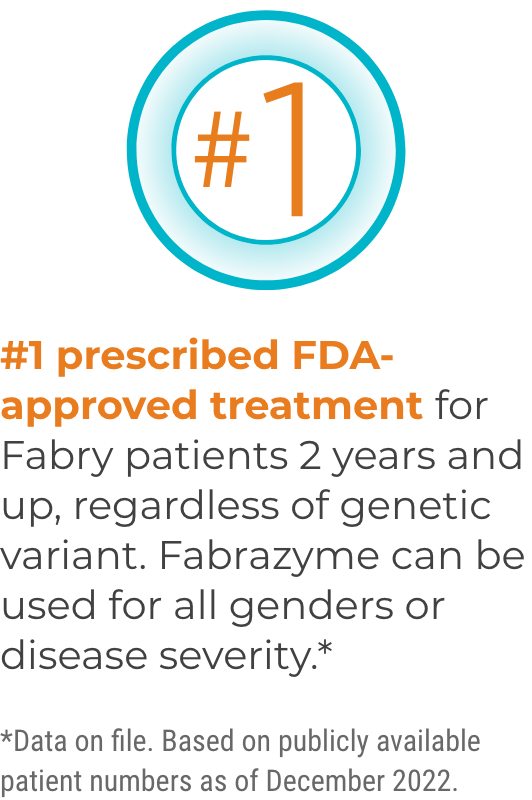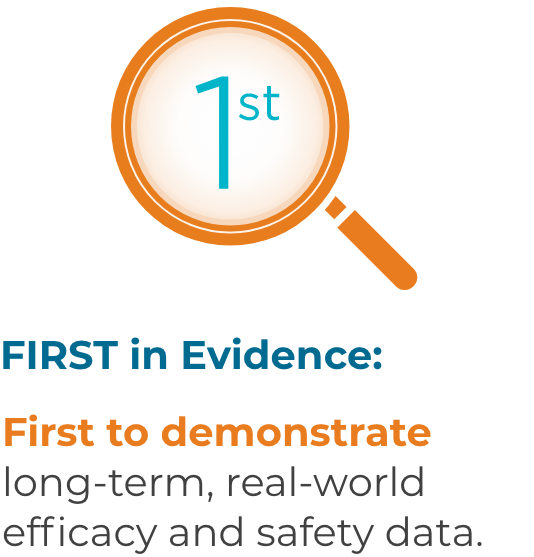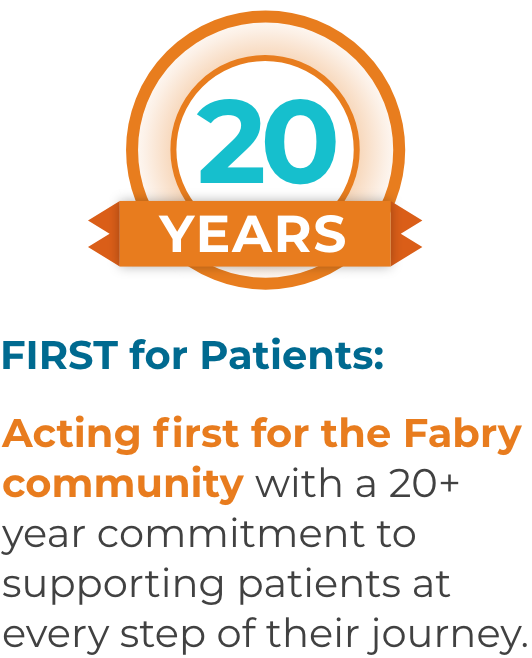FABRAZYME IS FIRST FOR FABRY
Females with Fabry are not just “carriers.” Learn more about Fabry disease in females.
Meeting essential treatment needs
Fabry disease is progressive and may become life threatening. If you’ve been diagnosed, you and your doctor should discuss if treatment is right for you.
How Fabrazyme works
Fabrazyme introduces an external supply of fully functional enzyme into the body. This enzyme is important in the healthy functioning of organs.
IMPORTANT SAFETY INFORMATION
WARNING: SEVERE ALLERGIC REACTIONS
Patients treated with enzyme replacement therapies have experienced allergic reactions, including severe or life-threatening reactions (known as anaphylaxis). Anaphylaxis has occurred during the early course and after repeated treatment with enzyme replacement therapy.
Your healthcare professional should initiate Fabrazyme in a healthcare setting with appropriate medical monitoring and support measures. If a severe allergic or anaphylactic reaction occurs, your healthcare professional will immediately stop the infusion and provide appropriate medical treatment. Seek immediate medical care should symptoms occur.
Fabrazyme can cause serious side effects, including:
Severe Allergic Reactions Including Anaphylaxis
Approximately 1% of patients who received Fabrazyme experienced a severe allergic or anaphylactic reaction during their infusion. Some of these reactions were life-threatening, and included:
- Swelling of the face, mouth and throat, narrowing of breathing airways, low blood pressure, hives, difficulty swallowing, rash, trouble breathing, flushing, chest discomfort, itching and nasal congestion.
- Tell your healthcare professional if you experience any of these symptoms.
- Your healthcare professional may give you medicines before you receive Fabrazyme to help manage these reactions.
In clinical studies, some patients developed IgE antibodies or a reaction to an allergy skin test specific to Fabrazyme. IgE antibodies can sometimes be produced by the body’s immune system during an allergic reaction. Your healthcare professional may test you for IgE antibodies if you experience a suspected allergic reaction to help assess the risks and benefits of continuing treatment.
Infusion-Associated Reactions
In clinical studies, 59% of patients experienced infusion-associated reactions (IARs) during Fabrazyme administration, some of which were severe. IARs are defined as those occurring on the same day as your infusion. IARs occurred more frequently in patients who were positive for anti-Fabrazyme antibodies than those who did not have anti-Fabrazyme antibodies.
- You may receive medicines to help prevent IARs. IARs have happened in some patients even after taking these medications before their infusions.
- If an IAR occurs, tell your healthcare professional, who may slow the infusion rate, stop the infusion, and/or provide appropriate medical treatment as needed.
- People with advanced Fabry disease may have heart problems, which could put them at a higher risk for severe complications from IARs. Tell the healthcare professional for your infusions if you have known heart problems.
Common Side Effects
Side effects reported in 20% or more of Fabrazyme treated patients in clinical studies compared to placebo were upper respiratory tract infection, chills, fever, headache, cough, burning and/or tingling sensation, fatigue, swelling in the legs, dizziness, and rash.
Please see full Prescribing Information, including Boxed WARNING
IMPORTANT SAFETY INFORMATION
Show moreWARNING: SEVERE ALLERGIC REACTIONS
Patients treated with enzyme replacement therapies have experienced allergic reactions, including severe or life-threatening reactions (known as anaphylaxis). Anaphylaxis has occurred during the early course and after repeated treatment with enzyme replacement therapy.
Your healthcare professional should initiate Fabrazyme in a healthcare setting with appropriate medical monitoring and support measures. If a severe allergic or anaphylactic reaction occurs, your healthcare professional will immediately stop the infusion and provide appropriate medical treatment. Seek immediate medical care should symptoms occur.
Fabrazyme can cause serious side effects, including:
Severe Allergic Reactions Including Anaphylaxis
Approximately 1% of patients who received Fabrazyme experienced a severe allergic or anaphylactic reaction during their infusion. Some of these reactions were life-threatening, and included:
- Swelling of the face, mouth and throat, narrowing of breathing airways, low blood pressure, hives, difficulty swallowing, rash, trouble breathing, flushing, chest discomfort, itching and nasal congestion.
- Tell your healthcare professional if you experience any of these symptoms.
- Your healthcare professional may give you medicines before you receive Fabrazyme to help manage these reactions.
In clinical studies, some patients developed IgE antibodies or a reaction to an allergy skin test specific to Fabrazyme. IgE antibodies can sometimes be produced by the body’s immune system during an allergic reaction. Your healthcare professional may test you for IgE antibodies if you experience a suspected allergic reaction to help assess the risks and benefits of continuing treatment.
Infusion-Associated Reactions
In clinical studies, 59% of patients experienced infusion-associated reactions (IARs) during Fabrazyme administration, some of which were severe. IARs are defined as those occurring on the same day as your infusion. IARs occurred more frequently in patients who were positive for anti-Fabrazyme antibodies than those who did not have anti-Fabrazyme antibodies.
- You may receive medicines to help prevent IARs. IARs have happened in some patients even after taking these medications before their infusions.
- If an IAR occurs, tell your healthcare professional, who may slow the infusion rate, stop the infusion, and/or provide appropriate medical treatment as needed.
- People with advanced Fabry disease may have heart problems, which could put them at a higher risk for severe complications from IARs. Tell the healthcare professional for your infusions if you have known heart problems.
Common Side Effects
Side effects reported in 20% or more of Fabrazyme treated patients in clinical studies compared to placebo were upper respiratory tract infection, chills, fever, headache, cough, burning and/or tingling sensation, fatigue, swelling in the legs, dizziness, and rash.
Please see full Prescribing Information, including Boxed WARNING
INDICATION AND USAGE
Fabrazyme® is used to treat adults and children 2 years of age and older with confirmed Fabry disease.


